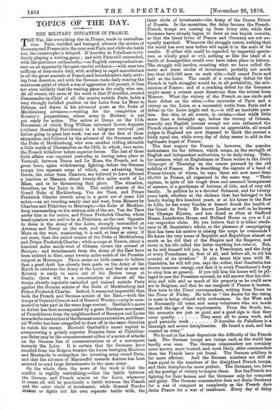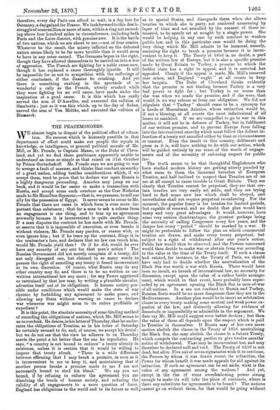TOPICS OF THE DAY.
THE MILITARY SITUATION IN FRANCE.
THE War, like everything else in France, tends to centraliza- tion. Paris, fortified and besieged, attracts the armies of Germany and France into the zone near Paris, and while she holds
out, the catastrophe is delayed. D'Aurelles de Paladines is evi- dently playing a waiting game ; and with Paris still untouched, with the provinces enthusiastic,—as English correspondents as- sure us, on apparently the most careful evidence,—with near two millions of men under drill, with artillery in rapid manufacture in all the great arsenals of France, and breechloaders daily arriv- ing from America, and with the German ranks daily nearing the maximum point of which a war of aggression will permit, it does not seem unlikely that the waiting game is the really wise one.
At all events, the news of the week is that D'Aurelles, created Commander-in-Chief of all the armies outside Paris, holds a very strongly fortified position on the Loire from Le Mans to Orleans, and draws in his advanced posts as the Duke of Mecklenburg advances,—waiting for the completion of Keratry's preparations, whose army in Brittany is not yet ready for action. The action at Dreux on the 17th November, of which King William informed Queen Augusta (without thanking Providence) in a telegram received just before going to press last week, was one of the first of these skirmishes, and followed by the advance of the Germans under the Duke of Mecklenburg, who won another trifling skirmish a little north of Chateaudun on the 18th, in which, once more, the French withdrew before superior forces. The last of these little affairs was reported yesterday as having taken place at Verneuil, between Dreux and Le Mans, the French, not in great force, again withdrawing, fighting, before the German troops, two separate corps of which, one advancing from Dreux, the other from Chartres, are believed to have effected a junction at Mamers, about twenty-five miles north of Le Mans, and to be threatening that place. The situation, therefore, on the Loire is this. The united armies of the Grand Duke of Mecklenburg, Von der Tann, and Prince Frederick Charles stretch away in a great arc of some 130 miles,—an arc trending nearly east and west, from Mamers by Chartres and Pithiviers to Montargis,—the Duke of Mecklen- burg commanding on the western side of the arc, Von der Tann under him in the centre, and Prince Frederick Charles, whose head-quarters are said to be at Pithiviers, on the east. Opposite to them is the Army of the Loire, strongly entrenched at Artenay and Toury on the east, and stretching away to Le Mans on the west, numbering, it is said, at least as many, if not more, than the united armies of the Duke of Mecklenburg and Prince Frederick Charles ; while a corps at Nevers, about a hundred miles south-west of Orleans, covers the arsenal of Bourges ; and detachments from the Army of the East have been ordered to Gien, some twenty miles south of the Prussian outpost at Montargis. There seems no little reason to believe that a good draft has already been made on the Army of the North to reinforce the Army of the Loire, and that as soon as Keratry is ready to move out of his Breton camp at Conlie, there will be a concentration of almost all the troops already regularly embodied and trained outside Paris against the German armies of the Duke of Mecklenburg and Prince Frederick Charles. Indeed, it seems not impossible that both the French and German armies of the East,—both the troops of General Creuzot and of General Werder,—may be sum- moned to take part in the same huge contest. Garibaldi's move to Autun has been accompanied by a great Northern movement of French forces from the neighbourhood of Besancon and Lyons towards the eastern line of the German communications, and Gene- ral Werder has been compelled to draw off in the same direction to watch his enemy. Ricciotti Garibaldi's smart exploit in overpowering a greatly superior Prussian force at Chatillon- sur-Seine may be the commencement either of a series of attacks on the German line of communications or of a movement towards the Loire. It is certain that the Germans have recalled from the Belgian frontier the forces besieging Mezieres and Montmedy to strengthen the investing army round Paris, and that the advance of Manteuffel towards Amiens has been arrested to send large detachments to the same army.
On the whole, then, the news of the week is that the conflict is rapidly eentralizing,—that the battle between the German and French armies on the Loire, whenever it comes off, will be practically a battle between the French and the outer circle of investment, while General Trochu detains or fights out his own separate battle with, the inner circle of investment—the Army of the Crown Prince of Prussia. In the meantime, the delay favours the French..
French troops are coming up from every side, while the Germans have already begun to draw on raw boyish recruits,. so that the latest levies of France and Germany are not un- equally matched. Whenever the struggle comes, nothing that the world has ever seen before will equal it in the scale of its' results. If either side could be regarded by impartial specta- tors as wholly good or evil, nothing so like the ideal of a battle of Armageddon would ever have taken place in history. The struggle will involve, counting what we have called the outer and inner circles of investment, probably not much less than 600,000 men on each side,—half round Paris and half on the Loire. The result of a crushing defeat for the French in both struggles would be, in all probability, the sub- mission of France ; and of a crushing defeat for the Germans might mean a retreat more disastrous than the retreat from Moscow. What the victory of the French on one circle and their defeat on the other,—the surrender of Paris and a victory on the Loire, or a successful sortie from Paris and a defeat on the Loire might end in,—is still an insoluble ques- tion. But this, at all events, is certain,—that while little more than a fortnight ago, before the victory of Orleans, scarcely any English journal except our own estimated the French chances of ultimate success as appreciable, all sound judges in England are now disposed to think the contest a fairly equal one, while every day of delay seems to add to the legitimate hopes of France.
The best augury for France is, however, the popular enthusiasm for the defence, which seems, on the strength of English and independent authorities, to be daily rising. Take, for instance, what an Englishman at Tours writes to the Dailg Telegraph of Thursday on the course pursued by the old nobility of France. He is describing the captain of a band of Francs-tireurs, of whom, he says, there are now more than 80,000 in France, all organized in the same way. "Their captain, in spite of his rough dress and assumed brusquenesa of manner, is a gentleman of fortune, of title, and of very old. family. In politics he is a devoted Orleanist, and for twenty years back, whether at the chateau that has belonged to his family during five hundred years, or at his house in the Rue de Lille, he has every Sunday at dessert drunk the health of the Count de Paris. He knows London as well as he knows. the Champs Elysees, and has dined as often at Stafford House, Lansdowne House, and Holland House as you or I at our respective clubs. Do you believe that it is either obedi- ence to M. Gambetta's edicts, or the pleasure of campaigning that has been his motive in raising the corps he commands 11 He hates the very name of Republic and Republican almost as much as he did that of the Empire and the Emperor, and never in his life called the latter anything but celui-ci. But, as he will himself tell you, he is a Frenchman, and the duty of every Frenchman is, first of all, and before all, to rid his country of its invaders." If you taunt this man with M. Gambetta, he will tell you, says the writer, that Gambetta has shown immense energy, and that it is every Frenchman's duty to obey him at present. If you tell him his house will be pil- laged in case the Prussians succeed, he will answer that his chil- dren and wife and as much of his property as he could save are in Belgium, and that he can emigrate if France is beaten. Now turn to the Times' correspondent, writing from Tours to the Times of Friday. He tells us "the decree for the rising in mass is being obeyed with enthusiasm. In the West and. in Normandy all come, and many volunteers who are much beyond the age of the requirements. From the South, too, the accounts are just as good, and a good sign is that they
come quietly They seem all to mean work, and good patriotic work D'Aurelles de Paladines is a thorough and severe disciplinarian. He found a mob, and has created an army."
We do not in the least depreciate the difficulty of the French task. The German troops are troops such as the world has hardly ever seen. The German commanders are certainly more known, more trusted, and, most likely, abler commanders than the French have yet found. The German artillery is far more efficient. And the German numbers are still at. least equal to the numbers of the disciplined French troops, and their discipline far more perfect. The Germans, too, have all the prestige of victory to inspire them. But the French are fighting for their homes, and the Germans only for conquest and glory. The German commanders dare not drain Germany for a war of conquest as completely as the French dare drain France for a war of resistance. Every day of delay
therefore, every day Paris can afford to wait, is a day lost fOr Germany, a daygained for France. We look forward to this death- struggle of somemillion or more of men, within a ring not exceed- ing above four hundred miles in circumference, including both Paris and the Loire district, with genuine awe. It is the battle of two nations, which we are about to see,—not of four armies. Whatever be the result, the misery inflicted on the defeated nation seems likely to be far more terrible than it would seem to have in any sense earned. The Germans began in the right, though they have allowed themselves to be carried on into a war of aggression. The French are fighting for a noble cause now, though it has replaced a cause thoroughly ignoble. It will be impossible for us not to sympathize with the sufferings of either combatant, if the disaster be crushing. And yet there is something exalting in the spectacle of so wonderful a rally as the French, utterly crushed while they were fighting for an evil cause, have made under the inspiration of a good cause. It is this which has really nerved the arm of D'Aurelles, and executed the volition of Gambetta ; just as it was this which, up to the day of Sedan, nerved the arm of Von Moltke, and executed the volition of Bismarck.



































 Previous page
Previous page